I’m All About Innovation and Innovators So I Love This Story.
As “Risk It or Regret It” stories go – I don’t think we have a choice here but to risk it.
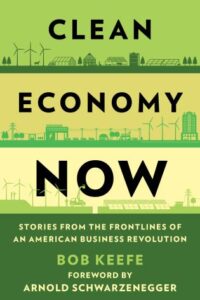
In his new book “Clean Economy Now: Stories from the Front Lines of an American Business Revolution” Bob Keefe the Executive Director of E2 a national nonpartisan business group of 10,000 business leaders which has been around for 25 years, describes his recent travels across the country.
He wanted to witness first-hand all the clean energy projects in motion because of the significant private sector investment and job creation that’s happened incredibly fast over the past 20 months since The Inflation Reduction Act.
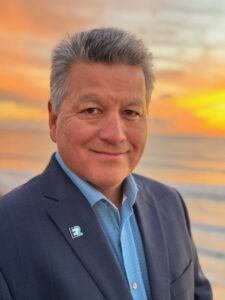
Bob checked in on my show live from the Annual Society of Environmental Journalists, at the University of Pennsylvania co-hosted by the Penn Center for Science, Sustainability, and the Media, in collaboration with the Annenberg Public Policy Center.
He joined me live just minutes after the recent earthquake we had in the northeast rattled my radio studio in Greenwich CT.
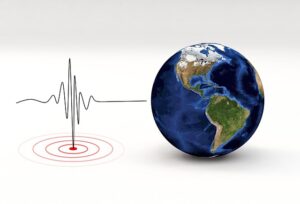
The same earthquake did hit parts of PA, so Bob and I had some fun talking about earthquakes in general since Bob is from L.A.. (I’m never relaxed staying at hotel where they have earthquake kits in the nightstand drawer.) Bob said he didn’t really feel it at all where he was, but he did mentioned he was feeling…an economic earthquake.
It’s an economic revolution like we haven’t seen says Bob. And he’s making sure we are all paying attention.
“I truly believe that we are at the advent of an American economic revolution”, he said, “the likes of which we have not seen in this country in generations, maybe if ever. And let me tell you why I say that.“
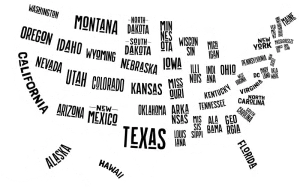
“Right now, my organization is tracking clean energy projects around the country since the passage of the landmark IRA, the Inflation Reduction Act and some other policies 20 months ago. And what we know is this, there are more than 300 major factories and other projects, clean energy projects, coming out of the ground across America right now. $118 billion worth of private sector investment. That’s companies that are putting money into these projects. “
“These aren’t government grants or loans. These are companies investing in America. A hundred thousand jobs have been already announced just in those past 20 months. When in this country have we ever seen 300 factories and other major projects coming out of the ground? When have we seen this kind of investment?”

“We have foreign companies that are investing in the United States and creating jobs here now versus taking American jobs and doing stuff overseas. And it’s not just creating all this economic growth, it’s putting America on competitive again with the rest of the world.”
“We understand that we can’t have a good economy without a good environment, and we can’t have a good environment without a good economy. “
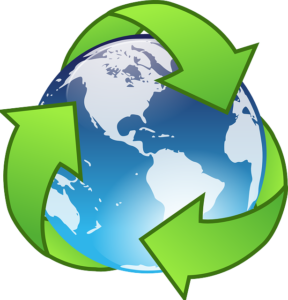
Bob points out that In New York alone there have been about a dozen major projects that E2 has tracked. $800 million worth of private sector investment in New York from companies, 3,000 plus jobs created.
Bob and I talked about the offshore wind farm, the nation’s first commercial offshore wind farm that just opened off Montauk, New York whihc I was following. Twelve turbines are going to provide enough juice for about 70,000 homes said Bob. And Bob mentioned there’s another company that’s building a converter station to essentially take offshore wind energy and convert it and get it onto the grid into people’s homes.
We discussed many specific projects, besides the offshore wind farms including solar panel factories, battery technology and the potential of hydrogen as a clean fuel. I was captivated by the speed of what’s happening and I think you will be too.
There’s company called Air Products is now going to clean hydrogen and they’re building one of the first factories in Messina, New York. In Connecticut, there’s a company called Mott Corporation that’s building filtration systems for use in things like this hydrogen. And mentioned there’s another company called NEL, N-E-L, that relocated here from the Netherlands who are building something called electrolyzers that are going to be used by hydrogen plants like the one being built in Messina to produce hydrogen. Right now he said, there are something like 30 or 40, battery factories being built in America and about 60 solar factories popping up all around the country.
And l this is happening in places that Bob points out, you would not expect it to happen.
“As part of the book, I started off in a place called Kings Mountain, North Carolina. Well, Kings Mountain is home to an old lithium mine that was first established in the 1950s. At one time, it supplied lithium for the Manhattan Project, right? We all know what that is. Well, we have a company now that’s restarting that mine because to supply batteries to manufacturers throughout the Southeast and other places. “
“Drive down the street to Dalton, Georgia. And Dalton, Georgia used to be the carpet capital of the world, maybe it still is. Well right now a company called Q-Cells is building what will be the biggest, one of the biggest solar panel factories in the Western Hemisphere. Wow. In little old Dalton, Georgia. You know go a little further down the street in Georgia to Savannah and Kia and Hyundai are building one of the biggest electric vehicle factories on the planet. This is incredible stuff happening. “
Did you know that Georgia is the number one state for clean energy projects right now? And that North Carolina has more investments in clean energy projects than any state? But big things are also happening in Alabama, Louisiana, New York, and I Connecticut.
Arnold Schwarzenegger did the foreword to Bobs’ book.
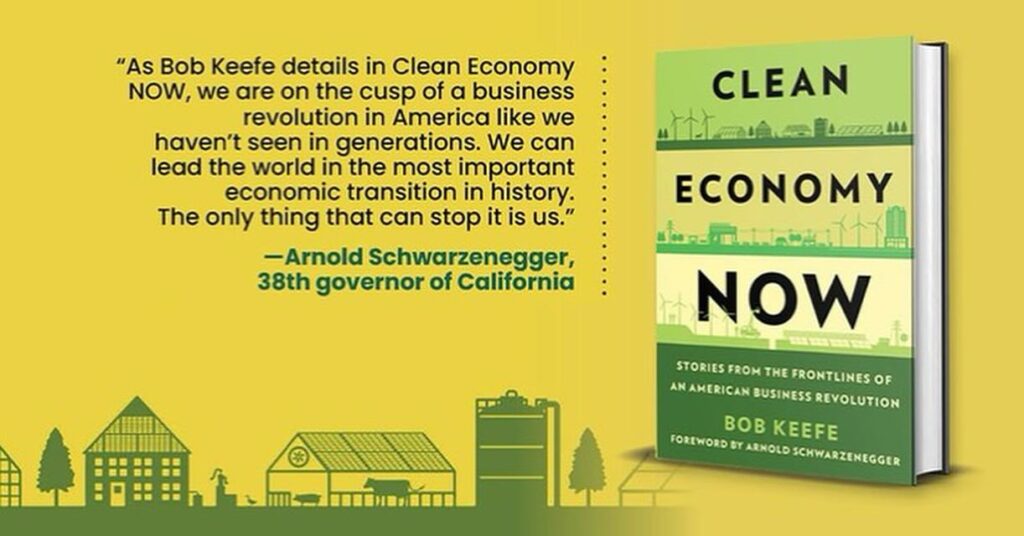
Enjoy this fascinating interview about the current American Economic revolution in this podcast of my live conversation with Bob Keefe, Executive Director of E2, a national nonpartisan business group of 10,000 business leaders, on The Debbie Nigro Show. if you’d rather read than lisetn the transcript is below .
AUDIO TRANSCRIPT:
0:00:00
Okay guys, you think I planned to have an earthquake today when I booked my guest who’s going to join me in just a second. Hi everybody, I’m Debbie Nigro. Bob Keefe actually, as I understand it, who’s about to join me to talk about his book that debuted this week, which is amazing, it’s called Clean Economy Now, stories from the front lines of an American business revolution and he says we are in fact at the beginning of the next American business revolution. As I understand it, may have just also felt the earthquake that we felt here because
1
0:00:29
Bob, are you somewhere in Philadelphia or out there?
2
0:00:33
I am in Philadelphia, and I must admit that I did not feel much of an earthquake, but you know, maybe we should be talking instead of talking about a business revolution, we should be talking about an economic earthquake today, Debbie.
1
0:00:45
Oh man, it’s an economic earthquake. Nice to have you back, Bob Keefe How have you been?
2
0:00:49
So great to be with you. Thank you so much. I love your show. I love the banter about earthquakes. You know I actually live in California but the biggest earthquake I’ve ever felt was actually in Washington DC back when was that a decade or so ago when the ground shook so much it put cracks in the Washington Monument. Wow. I don’t know if you
1
0:01:09
remember that but that was the biggest earthquake I’ve ever been in wow that was a big one my experience and my most terrifying earthquake related story has to do with California Bob when I first went out there And I am my first time I ever traveled to California and stayed in a hotel and you usually you’re in a hotel or motel Or a lovely place you open up a draw and there’s a Bible or you know Maybe I don’t know what else would be in there, but there was an earthquake like survival kit in my right I was like what do we beat? What are we talking about here? What are we talking about? I was nerved up, man.
5
0:01:38
Right, right, right.
1
0:01:40
Oh my goodness. Anyway, you’re causing an earthquake of excitement with what you’ve been doing. I know since we last spoke, because we featured your last book, which is, you know, your thing, you went around the country and did some really dramatic interviewing and following up on your topic.
And I just want to tell everybody, because I should have teed this up properly, what Bob does. He is the executive director of the national non-partisan business group called E2. I’m big on non-partisan. May we all get together and solve the world’s problems, Bob. I’m really with you.
1
0:02:12
I like that Arnold Schwarzenegger had a comment and you used him at the foreword of your book because people think if you’re talking clean economy that you have to be on one side of the political spectrum. But Arnold Schwarzenegger, who is the 38th governor of California and founder of the U.S.D. Schwarzenegger Institute and Climate Initiative said, may I just read his quote because I think it’s relevant. He said, when I think about how far America has come in building a cleaner economy, I can’t help but smile. It’s hard to imagine we can fail, but make no mistake, we can.
1
0:02:43
If we do, it won’t be a failure of innovation, of business. It will be a failure by us to come together to keep this great progress going. It will be a failure by us, collective us, to put aside our ideologies and political divisions and our complacency. It will be a failure for us to…
2
0:02:58
Hey Debbie, I’m getting a lot of background from your end about earthquakes. Can you hear me?
1
0:03:05
No, yeah, I can hear you, but I…
5
0:03:08
I’m sorry.
1
0:03:09
My engineer apparently just apologized. He lost his mind.
9
0:03:12
I didn’t realize I was going to feed him.
1
0:03:14
mind apparently you were getting the the earthquake feed and i was it was ok i got to know and i was not on the air so everybody thought i was just fine and thank you for
2
0:03:25
jumping in anyway i just read our letter that i heard your that’s right well i think you know i don’t force an aggravated people think of them as an actor people think of them as a lot of things but you gotta remember he was a governor of a democratic state, and when he was in office, that state did more to address climate change and advance clean energy than any place in the world, really, at the time. He was responsible for something called the Global Warming Solutions Act, which would
2
0:03:53
have been an aftermath, I think, to some Republicans today, but it really put California at the forefront of the clean economy and by the way help clean up our air and do something about climate change. So Governor Schwarzenegger is really, we’ve known him for a long time. My organization ET worked with him on that on that landmark law. Right. What was that 12, 15 years ago? I know, you tell me I’m not good with dates. And he’s been a champion ever since. Every year he does a major climate conference in his home country of Austria.
7
0:04:33
Very cool.
2
0:04:34
That brings people together from all over the world to talk about climate action.
1
0:04:37
So it’s pretty cool. Yeah, it’s cool. Let’s talk about where you are today. I know you’re participating, as we speak, in the Annual Society of Environmental Journalists, which is the University of Pennsylvania event they put on and this year the event is co-hosted as I’ve read by the Penn Center for Science, Sustainability and the Media in collaboration with the Annenberg Public Policy Center. So you’ve got some heavy-duty brains over there.
1
0:05:01
Are you just jumping out in the middle of the conference to do my show and going back in?
2
0:05:05
I am. I am. And I’ve got to tell you it’s pretty interesting being in a hotel full of several hundred journalists and I have to walk away to make a phone call for a journalist in New York, but I’m glad to do it.
1
0:05:19
Well I’m always honored to have you. I appreciate big brains, big brains. Now you just spent an entire year going around to assembly lines, to mines, a major journey through the country to see, as I understand it, what’s happening with all of a sudden this new activity that has been going on with all these new Major energy and clean vehicle projects in the U.S. And how how this money That has been pumped in For this purpose is working. Is that what you did? That’s right. That’s right, and I got to tell you Debbie
2
0:05:53
I truly believe that we are at the advent of an American economic revolution, the likes of which we have not seen in this country in generations, maybe if ever. And let me tell you why I say that. Right now, my organization is tracking clean energy job projects around the, or clean energy projects around the country since the passage of the landmark IRA, the Inflation Reduction Act and some other policies 20 months ago. And what we know is this, there are more than 300 major factories and other projects, clean energy projects, coming out of the ground all across America right now.
2
0:06:31
$118 billion worth of private sector investment. That’s companies that are putting money into these projects. These aren’t government grants or loans. These are companies investing in America. A hundred thousand jobs have been already announced just in those past 20 months. When in this country have we ever seen 300 factories and other major projects coming out of the ground? When have we seen this kind of investment?
2
0:06:58
We have foreign companies that are investing in the United States and creating jobs here now versus taking American jobs and doing stuff overseas. Amazing. And yeah, and it’s really not just creating all of this economic growth, it’s putting America on competitive again
8
0:07:16
with the rest of the world.
5
0:07:17
Interesting.
2
0:07:18
Think about it. You know, right now China makes probably 90% of the batteries that we use in this country in electric vehicles or for energy storage or something like that. Right now we have something like 30 or 40 battery companies, battery factories being built in America.
7
0:07:36
That’s great.
2
0:07:37
Solar panels. China and other Asian countries control about 90% of that market. Right now we have about 60 solar factories popping up all around the country.
1
0:07:47
So this has only been in the last year? This has all happened?
2
0:07:52
20 months.
5
0:07:53
That’s crazy.
4
0:07:54
That’s crazy, you’re right.
2
0:07:55
Crazy good. Crazy good.
1
0:07:57
I love crazy good.
2
0:07:58
And listen, this is happening in places that you would not expect it to happen. As part of the book, I started off in a place called Kings Mountain, North Carolina. Well, Kings Mountain is home to an old lithium mine that was first established in the 1950s. At one time, it supplied lithium for the Manhattan Project, right? We all know what that is.
3
0:08:21
Sure.
2
0:08:22
But it closed down in the 80s because a lot of this lithium production went overseas. Well, we have a company now that’s restarting that mine because to supply batteries to manufacturers throughout the Southeast and other places. Drive down the street to Dalton, Georgia. And Dalton, Georgia used to be the carpet capital of the world, maybe it still is.
2
0:08:44
But if you grew up in Dalton, you worked in the carpet mill, and your mom worked in the carpet mill and your grandma worked in the carpet mill. Well right now a company called Q-Cells is building what will be the biggest, one of the biggest solar panel factories in the Western Hemisphere. Wow. In little old Dalton, Georgia. You know go a little further down the street in Georgia to Savannah and Kia and Hyundai are building one of the biggest electric vehicle factories on the planet. Wow, this is incredible stuff happening.
2
0:09:17
Yeah, and if you look at it, it’s happening in places that perhaps were bypassed by previous economic transitions, right? I mean, the tech industry transition that was centered in Silicon Valley, the auto industry transition that was centered in Detroit, right, for so many years. But this is happening. Georgia is the number one state for clean energy projects right now. North Carolina has more investments in clean energy projects than any state, but it’s also Alabama, it’s Louisiana, and it’s New York, and it’s Connecticut.
2
0:09:51
Just three weeks ago, Orsted flipped the switch on what is the first commercial wind farm off the coast of Montauk.
1
0:09:59
I read about that, and I’m fascinated with it.
2
0:10:02
Yeah, it’s probably 70,000 homes. Yeah, I’m fascinated with them.
1
0:10:04
I’m like, why don’t we just put up these windmills and put them up everywhere? What are we waiting for here? And they’re gigantic. Have you ever seen one close up?
4
0:10:11
I have.
2
0:10:12
They’re pretty big.
1
0:10:13
Oh, yes. I’ve seen one vertical and I’ve seen one horizontal. There was one that was out of commission when I was traveling up in Prince Edward Island, Canada this summer, and I’m like, is that a giant wind thing sideways? You know, it’s like bigger than an airplane, right? Right.
2
0:10:28
And yeah, and this is revolutionizing the way we get electricity. That offshore wind farm is going to supply energy for about 70,000 homes. But guess what? Right now there’s another company that’s building a converter station, essentially to get that offshore wind to the grid. That’s happening in Astoria in New York. Really? It’s a $215 million investment and it’s basically they’re taking an old gas-fired power plant and turning it into a
2
0:10:56
converter station to get that offshore wind energy to our homes in New York and New Jersey and in Connecticut.
1
0:11:03
Amazing. So think about that. Yeah, I know it’s amazing. So this mission you’re on, where did it all spark from you? Because you’ve made this your passion, your mission, your job, your life’s work right now as the Executive Director of the National Nonpartisan Business Group, E2, and the writing and the traveling. Is this just something that’s always been in you? What does this all come from?
2
0:11:26
Well, look, E2 has been around for 25 years. We’re a national organization of more than 10,000 business leaders who understand that we can’t have a good economy without a good environment, and we can’t have a good environment without a good economy. So we work to make the business case, make the economic case for climate action, right? So yes, we care about polar bears, yes we care about melting ice caps, but we also care about the economic cost of climate change. What the tremendous toll on our economy that’s happening every single year to the tune of a hundred billion dollars a year now in major storms and other climate-related disasters
2
0:12:08
that we all as taxpayers have to pay to clean up. We also care about the economic benefits of climate action and that’s what we’re seeing right now. You know, right now, as I mentioned, there are 300 major clean energy projects happening around the country. That’s because policy that my, um, our, our members at E2 and us, you know, work hard to have, to make sure got passed in Washington. Yeah.
1
0:12:32
How do 10,000 members at this high level of integrity and intelligence make their voices all known in a group like yours, E2?
2
0:12:41
Well, we do it pretty much any way we can, Debbie. We have regular meetings with lawmakers, whether it’s in Washington or in state houses around the country, working on climate and clean energy policy. We sign a lot of letters. We call our lawmakers. We do what Americans are supposed to do, which is get engaged in the progress and the possibilities of democracy by making their voices heard.
1
0:13:10
Amazing. And the way it should be done. What is going on and why are you at this event today and for the next couple of days at the Society of Environmental Journalists at the University of Pennsylvania? What is going on there? Well, this is an annual meeting of environmental journalists from around the country.
2
0:13:23
And it’s a great way to get a handle on what folks are looking at, what they’re talking about. I’m about to walk into a session with a Jigar Shah, an old friend who now runs the Department of Energy’s loan guarantee program, who’s getting a lot of the DOE investments out the door to hear where this money’s going. Oh, wow. If you guys haven’t had a chance to know more about Bob Keith, his new book is out, Clean
1
0:13:49
Economy Now. It just came out this week, Stories from the Front Lines of an American Business Revolution, and the Four Words by Arnold Schwarzenegger. It is really great. Bob, you’re doing great work. Always a pleasure to have you here on the Debbie Nigro Show. Good luck with that book.
2
0:14:08
Thank you so much, Debbie, and thanks for having me on.
1
0:14:13
You’re welcome. I think we have to talk about one more topic, though, so hold on just one second. We’ll be right back here on the Debbie Nigro Show.
Welcome back, guys, to the Debbie Nigro Show. How’s everybody doing today? I know you’re a little shook up. It’d be a good day to play that elder song, All Shook Up. Where did that come from? Yes, the morning New York City and surrounding areas, Pennsylvania, New Jersey, Connecticut all felt a 4.8 magnitude earthquake which is pretty big. Started in New Jersey and just spread over there. Oh my goodness,
1
0:14:49
I’ll tell you it’s a good day to be talking to somebody else about this.
1
0:15:19
Bob Keefe is the Executive Director of the National Nonpartisan Business Group, E2, and his book, which has a foreword by Republican Governor Arnold Schwarzenegger, who actually, great statement he said, ìWe can lead the world in the most important economic transition in history.î And he points out, ìThe only thing that can stop it is us.î So basically, letís work together and letís figure this out. Bob, welcome to the show. It’s always great having you.
1
0:15:46
I know you are more aware than I am of things getting shook up in a good way here in the New York, Connecticut area, correct? Absolutely. Absolutely. What are we talking about? There has been a wind farm that’s just activated off the coast of Montauk or out there in Long Island that blew my head. I was like, this is amazing.
1
0:16:06
This is good. And you know about it. should know about in terms of the progress that is being made since just last year. I guess, you know, isn’t the first year after the landmark Inflation Reduction Act? Is that what we’re talking about?
2
0:16:16
That’s right. 20 months, 20 months time. A lot of progress in 20 months time, Debbie.
1
0:16:21
Okay, so there’s been $150 billion added to the US GDP. There have been hundreds of thousands of jobs created and lots of really crazy good impact from all these projects. So talk about a few highlights that you want everybody to be aware of from this area where we’re live that people might not know are going so good. Yeah, yeah, well
2
0:16:42
look absolutely as I mentioned there’s been 300 major clean energy projects all around the country. In New York there’s been about a dozen major projects that my organization E2 has tracked. $800 million worth of private sector investment in New York from companies, 3,000 plus jobs created. You and I talked a little bit about the offshore wind farm, the nation’s first commercial offshore wind farm that just opened off of Montauk, New York. Twelve turbines is going to provide enough juice for about 70,000 homes, Debbie. And as I mentioned right now, there’s another company that’s building a converter station, they call it, to essentially take offshore wind energy and convert it and get it onto
2
0:17:28
the grid so we can plug our toasters and computers into it in our homes.
1
0:17:32
Amazing.
2
0:17:33
Yeah, and that’s being built at a former gas plant in a place called quote unquote as my alley in New York pollution was so bad that’s how we clean up this is how we clean up our environment and this is how we advance our our economy as well but you know these these projects are popping up all over the place look at what’s happening at JFK airport right now what’s happening at that JFK well they’re building a new terminal there and on top of that terminal is 13,000 solar panels oh no
1
0:18:02
that I didn’t know see I know wait I know they’re building a new terminal because they’re always building a new terminal. That’s what goes on at airports in New York. New York is fully under construction when you’re trying to make a plane. But I didn’t know about the solar panels.
2
0:18:14
Especially JFK. So there’s 13,000 solar panels going on top of that new terminal. There’s a big stack of batteries that are battery-backed up that’s going to take that energy produced from the sun, store it in those batteries. There’s a couple of fuel cells there as well. And this is all for backup. So when we say, let’s just crazy thing happen like an earthquake
2
0:18:36
that knocks out the power grid or maybe a major winter storm, they’ll be able to keep the lights on in the terminal. They’ll be able to keep the new terminal functioning because of this micro grid that they’re building there. Wow, that’s really helpful to know. Yeah, yeah, absolutely. And look, I think it was a year or two years ago, the world’s biggest airport, Atlanta Hartsfield, had a power outage. And it stopped flights for hours there. I think Delta said it lost millions of dollars.
2
0:19:06
Delta is the biggest airline there, of course, because they couldn’t get flights in and out because they didn’t have any power. Well, hopefully at JFK when they finish that new terminal, they won’t have those kind of issues.
1
0:19:16
Wait, wait, Bob, I just wouldn’t want to be stuck in an airport when the lights went down with a zillion strangers, you know, not being able to see where you’re going. That wouldn’t be relaxing. You are not kidding. Not relaxing, Bob.
6
0:19:28
That’s right.
1
0:19:29
Hey, Bob, can we go back to one thing you said? You said, I’m fascinated with this offshore wind farm thing. And you said the one here in the New York area off Montauk is the nation’s first offshore wind farm. It’s not the first wind farm, the first offshore wind farm, right?
2
0:19:47
The nation’s first commercial offshore wind farm. So there’s been a couple of smaller wind farms that are offshore wind farms that have popped up for instance off of Rhode Island, Block Island. Much smaller and they were really kind of pilot projects. But this is the first one that really is providing electricity to all of New York, really.
1
0:20:10
Is there a plan to do another one like it somewhere else in the water? There’s a lot of water out there.
2
0:20:17
Absolutely. You know, because of some of the policies that got passed again a year and a half ago, because of the Biden administration’s focus on getting cleaner energy. There’s several other projects that are planned, not just off of New York, but off of the East Coast all the way down to, I think, the Carolinas.
1
0:20:35
OK, I have a stupid question and forgive me, I have to ask it. Is anybody working on wave energy? Every time I go to the beach, I’m like, why don’t we just capture the energy from these nonstop waves?
5
0:20:44
You know what? There are a lot of people working on that.
2
0:20:46
We haven’t seen it commercial yet, but the technology is there, and the technology actually, I believe, is being deployed in some other countries, just to a smaller scale. But we need to do everything we can to get more clean energy for us, and we need to look at everything. And yes, that includes wave energy, but it also includes the stuff we already know how to do, which is wind, which is solar, which is batteries, which is electric vehicles, that sort of thing. These solutions are already here. Yes, we need to keep looking for new ones and we need to keep moving forward, but the
2
0:21:24
good news is we’re finally, finally in this country starting to deploy some of the technologies that we invented here and now we’re trying to get it out into the economy at scale.
1
0:21:37
One thing I read, one of the facts that you guys educated me about was clean energy now comprises over 50% of New York’s energy jobs. That’s a pretty big number.
4
0:21:45
That’s right.
2
0:21:46
That is a big number. And if you look nationally, Debbie, I think there are about 3.3 million people that work in clean energy in one way or another. So we naturally think of solar installers, solar panel installers, or wind turbine technicians, or something like that. But think about the guys that are putting insulation in your attic. Think about the HVAC contractor, the heating air conditioning contractor, who’s in your neighborhood who’s now putting in high efficiency heat pumps, for instance.
1
0:22:18
Yeah. So what do you think are the most promising sectors that are coming in clean energy or, let’s say, clean transportation? What do you see? You’ve been around the country, you wrote a book about all this and you went around the country to see what was really going on. What did you come away with as standing out?
2
0:22:34
Well, you know, the advent, if you will, of battery technology and energy storage is simply a game changer, right? I mean, obviously, the missing link in clean energy was what happens when the sun goes down or when the wind doesn’t blow.
3
0:22:50
Correct.
2
0:22:51
Well, what happens now is that every single developer of solar or wind is doing those projects with battery systems as well. So they’ll be able to store the energy produced during the day and then put it on the grid when the sun goes down or when the wind isn’t blowing. And that’s the same batteries that are going into electric vehicles. So batteries is a huge missing link. The other one I think that we need to watch is hydrogen. Hydrogen has been described as kind of the Swiss Army knife of fuels.
2
0:23:31
It’s hard to power an airplane or even a big tractor trailer with batteries. but the folks that are developing hydrogen say that it’s the ultimate fuel for major transportation systems. It’s the ultimate fuel for running factories, things like that.
1
0:23:48
I can’t imagine. I’m thinking about a truck stop where a truck pulls in and fills up on hydrogen. How’s that going to work?
2
0:23:55
Yeah. Well, kind of the same way it fills up on diesel these days, it’s only a lot cleaner.
1
0:24:00
Oh, okay. You know, you’ve got a… Yeah, I’m sorry, I didn’t mean to interrupt you, but while you’re talking, because I’m listening and imagining things in my head, when you were talking about solar, I immediately wanted to just… my brain went to how many cloudy days we’ve just had in New York for so… suspended period of time, and I’m like, what do you do with solar when there’s so much cloud?
1
0:24:21
You just answered it by reserving when there has been sun so that the battery backups work. Okay, this is good. Are there any battery factories in the New York area being built?
2
0:24:30
Well, let me tell you about that. For instance, in upstate New York in Rochester, GM has had a car factory up there for decades now. They build parts for big V8 engines, but guess what? Now they’re investing $56 million into that factory to also produce uh… battery parts the use in electric vehicles and continuing giving uh… uh… uh… new life to the workforce there in the new opportunity to to keep moving forward so we’re not shunned down uh… factories that that
2
0:25:05
are building gas-powered cars right now in the scene in new york we talked about hydrogen company called air products is building a uh… hydrogen plant. That is, it’s a $500 million investment, is gonna have about 100 employees. Air Products is one of the oldest companies in the country. They got their start, believe it or not, figuring out how to put oxygen into fighter jets
2
0:25:28
during World War II.
3
0:25:30
So cool.
2
0:25:31
You know, when pilots went up. But now, interesting name, Air Products, but now they’re going to clean hydrogen and building one of the first factories in Messina, New York.
1
0:25:40
Oh, that’s interesting.
2
0:25:41
Yeah. On the other side, you know, in Connecticut, there’s a company called Mott Corporation that’s building filtration systems for use in things like this hydrogen. And there’s another company called NEL, N-E-L, that I think relocated here from the Netherlands or someplace in Europe. But they’re building something called electrolyzers that are going to be used by hydrogen plants like the one being built in Messina to produce hydrogen. So this is what I’m talking about when I’m talking about an economic revolution. It’s not just a project here, it’s not just a project there. These are projects that are rippling throughout the economy. And while we’re talking about the direct benefits of all of this, Debbie, think about the indirect benefits.
2
0:26:26
Think about the additional tax dollars that are gonna flow into the local economy that are gonna put more cops on the street and more teachers in the classroom. Think about the construction workers who need a place to eat who are gonna go down to the local diner or stay in the local hotel
2
0:26:41
while they’re building these factories. It’s an economic revolution like we haven’t seen.
1
0:26:45
Well, you got my attention today, Bob. So glad that you spent the time to sum it all up because it’s a mouthful for sure about what’s going on out there but if anybody out there would like to get educated in a lovely way and really be on top of what what’s happening with the American business and the revolution in this country you want to check out Bob Keefe’s new book that debuted this week called Clean Economy Now, stories from the front lines of an American business revolution. Bob Keefe again is the executive.
1
0:27:11
director of the National Nonpartisan Business Group which I really love that he does, called E2. So hopefully we can see things in one eye, in one vision from whatever side you are coming from and know that this is good for all of us, right? Let’s keep it going. Bob, have a great rest of your day and get back to your conference there in Philadelphia, Bob, have a great rest of your day and get back to your conference there in Philadelphia, okay?
Transcribed with Cockatoo


